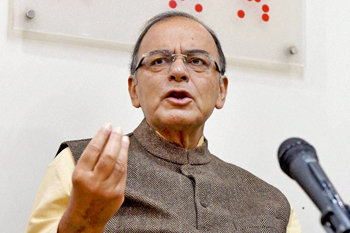
New Delhi, Jan 19: Terming it as the “desire of the media to be an actor” while reporting from scenes of security operations, Union I&B Minister Arun Jaitley Sunday said the country’s security and defence establishments were of the view that this cannot be allowed and that the matter was under “serious and very advanced consideration” of the government.
“How do you report instances where insurgent action is on… where a security operation is in full swing? Should the media go into the midst of the scene and therefore report from the spot as to what is happening. Or, should the media have some constraints?” Jaitley asked. He was delivering the first Justice J S Verma memorial lecture on ‘Freedom & Responsibility of Media’ here.
“We’ve have intelligence information to say that because Indian television had decided to bring the 26/11 reporting almost in real-time as to what action was being taken, the terrorists inside the hotels were being informed on their satellite phones by their handlers as to what the Indian security forces were doing,” Jaitley said.
“Our security agencies and the Ministry of Defence are clearly of the view that this cannot be allowed. And, therefore, during the limited duration when the security operation is on, a very strict discipline on the kind of reporting which is to take place from the place of the incident will have to be maintained. This issue is under serious and very advanced consideration of the government,” he added.
On instances of trial by the media, Jaitley said, “I am constrained to observe that certain trial courts are under tremendous pressure, particularly in high-profile cases where the media has conducted a parallel trial and almost declared somebody guilty or innocent.”
The minister also underlined that the “privacy of individuals” even in “high-profile cases” needed to be respected and that “media will have to seriously introspect as to what extent it should go to” when dealing with “areas which have no bearing on larger public interest” but “can only add some spice to the content of the report”.
On the “sub judice rule”, Jaitley said in larger matters of public interest, one cannot have a complete gag on the media “merely because an issue is pending in a court”. He, however, added that if there are “issues relating to individual culpability — where innocence or guilt has to be judged — the parallel trial concept prejudices the entire environment around which a person is to get justice”.
The minister also said any move where the government gets into “disciplining media organisations” may have its own pitfalls.
“It may have its own pitfalls if the government gets into the business of disciplining media organisations. I would be more comfortable if the viewers or the readers decide that,” Jaitley said.
On the issue of cross-holdings in the media, Jaitley said most jurisdictions the world over ban cross-holding rights. “If you own newspapers, you cannot own channels. If you own channel, then you can’t own the medium through which a channel is telecast, that is, the cable or DTH. We have no such restrictions,” he said.
Stating that the media today has a responsibility “to be credible, to be fair, to be an educator on sensitive issues and to maintain the highest standards of financial integrity”, Jaitley added that the “media will have to be extra careful where its own interests are involved and therefore wherever there is a possibility of conflict of interest, adequate disclosure to that effect has to be made”.





Comments
Add new comment